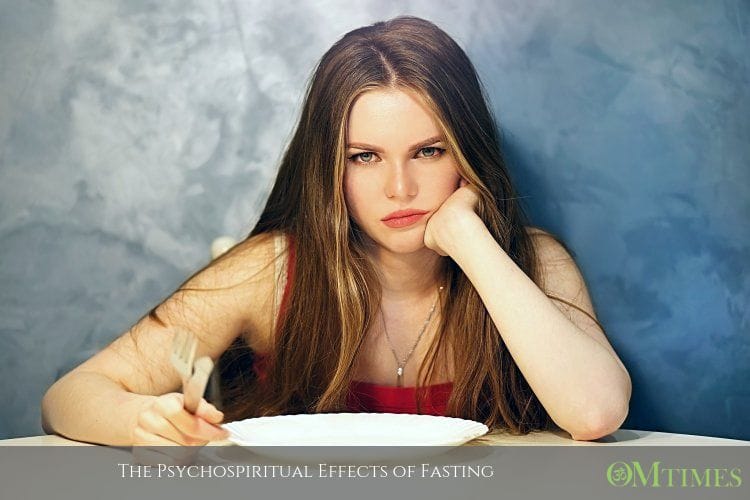The Psychospiritual Effects of Fasting

What does fasting do to the body? Discover the psychospiritual effects of fasting that affect the mind and spirit to see if the benefits are for you.
Why Fasting?
by Randi Fredricks, Ph.D.
One of the most advantageous aspects of fasting is the effect it has on our emotional states. Although emotions often feel more intense during and after a fast, this phenomenon is part of a natural process. The calmer an individual remains during a fast, the easier it is for them to move through emotional experiences. Research has noted common emotional themes during fasting, most notably related to feelings of irritability and joy. The negative emotions that surface during fasting tend to relate to feelings of grief over the temporary loss of food.
Perhaps the most prevailing beliefs of human nature is that people need food in order to survive. As noted in the hierarchy of needs as created by psychologist, Abraham Maslow, food is associated to basic survival. In some instances, this need is so great it overshadows one’s ability to see clearly. From the day we are born, the desire for food reigns dominant. The inner drive for food is almost constantly present on some level throughout life and rarely leaves.
Attachment to food is undeniable. As soon as an individual attaches to something, a situation starts in which he or she may have to grieve its loss. Because attachment to food is interrupted during a fast, grief is a significant part of the fasting experience.
The grief that is connected with fasting has the potential to create significant positive growth if participants are able to recognize their less productive attachments and let go of them. In this manner, fasting can assist with detachment from our mundane everyday existence.
If an individual associates food with love and nurturing, fasting will challenge the most fundamental of all belief systems. For those who unconsciously avoid their feelings by using food, fasting provides an opportunity to face the pain hidden beneath that relationship. For someone who uses food as a coping mechanism or to fill an emotional void, fasting can reveal unhealthy habits.
Fasting creates suffering on many levels, but the degree to which one is able to feel one’s suffering is parallel to one’s ability to feel joy. Italian psychiatrist Robert Assagioli suggested that these higher experiences activate feelings from the lower unconscious. Thus, it creates anxiety as we feel wounded, fearful, angry, and depressed.
Similar to other consciousness-raising events such as mediation, fasting can potentially create psychological and spiritual disturbances. We associate fasting with these types of changes because of the unique relationship it has with the psychospiritual aspects of human development.
The term psychospiritual is defined in a variety of ways, beyond the literal and conceptual reunion of the psyche and the spirit. In human development, it can be defined as the relationship between self-concept, emotional well-being, sources of inspiration, as well as the meaning and purpose in one’s life. Some clinicians have suggested that psychospiritual approaches to psychotherapy can help facility change on the deepest levels of consciousness.
The goal of both the faster and the psychotherapist is to recognize which psychospiritual aspects of the person’s life are preventing psychospiritual growth. When fasting, an individual has the potential to experience psychospiritual autophagy. This is a term I coined to explain the process of holistic reintegration that occurs during fasting.
Autophagy is a normal biological process in the body that is self-protective. During fasting, for example, the body segregates and digests portions of cell’s cytoplasmic material. Recent research into fasting and cancer has shown that the process of autophagy has certain healing powers. These include the power to shrink and, in some cases, completely eliminate benign growths, such as breast cysts and uterine fibroids. These are prime examples of non-essential tissue that become recycled during a fast. The phenomenon of autophagy explains why persons who fast experience tremendous physiological changes, and may also suggest why remarkable psychological and spiritual changes occur as well.
The theory of psychospiritual autophagy proposes that fasting induces various types of autophagy on three levels; physiological, psychological, and spiritual. During psychospiritual autophagy, the psyche segregates and digests emotional and spiritual imbalances much in the same way as cellular autophagy. For people who experience psychospiritual autophagy-a significant change in the psychospiritual realm-post-fasting psychotherapy may be a useful intervention.
The purpose and focus of psychotherapy would be to assist the faster in assimilating the psychospiritual changes that occurred during the fast. This prevents the faster from using defense mechanisms to dismiss or deny these changes. This premise, based on the theory of holism, suggests that when something as significant as autophagy occurs, it impacts the person on all levels; mind, body, and spirit.
This belief system is based on the principle of holism. Holistic approaches to health care appeared in what was termed psychosomatic medicine in the 1970s. These were used to conceptualize and treat psychosomatic phenomena. Instead of charting one-way causal links from the psyche to soma (the body), or vice-versa, it aimed at a systemic model. In this model, we see multiple biological, psychological and social factors as interlinked.
At present, it is commonplace in psychosomatic medicine to state that we cannot separate the psyche and the body for practical or theoretical purposes. A disturbance on any level-somatic, psychic, or social-will radiate to all the other levels as well. In this sense, psychosomatic thinking is similar to the biopsychosocial model of medicine which links biology, psychology, and sociology in a similar manner. By the early 2000s, psychosomatic medicine had become a psychiatric sub-specialty.
psychotherapy, holism is based on the concept that all aspects of a person-psychological, physical, and spiritual-affect one another. We see the whole person comprised of these parts. Therefore, we posit that one aspect of the person cannot be affected without impacting the others. The concept of holism is found in trans-personal psychology and alternative medicine. Fasting often helps with emotional challenges because of how it takes the focus off of our own needs. It opens us to a larger world.
Click HERE to Connect with your Daily Horoscope!
You will also enjoy 2 Holistic Ingredients for Perfect Weight
About the Author
For more information about fasting and psychospiritual autophagy, visit the website for Dr. Fredricks’ 2012 ArthurHouse book, Fasting: An Exceptional Human Experience, at http://fastingexperience.com or http://drrandifredricks.com.
OMTimes Magazine is one of the leading on-line content providers of positivity, wellness and personal empowerment. OMTimes Magazine - Co-Creating a More Conscious Reality





